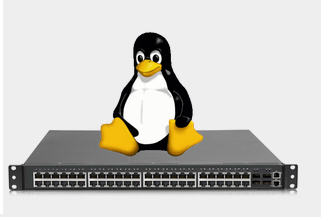Driven by speed, economy, and the need for vendor freedom, many companies have been developing custom NOS (Network Operating System) on open networking platforms. To further advance network innovation, OCP (Open Compute Project) has been working to standardize open networking software and hardware. OCP’s Open Network Linux enables organizations to rapidly innovate and build modern, modular, next-generation NOS stacks by leveraging open source software on open network switches.

What Is Open Network Linux?
Open Network Linux is an OCP networking project. It is a Linux distribution for open hardware switches, namely network forwarding devices built from commodity components. It features an open networking hardware platforms with a unique architecture for pluggable forwarding stack and device management & programming software. It is the basic component for consumers who want to build NOS on top of open networking switches. Based on Open Network Linux, networking solutions can provide speed, freedom, and commercial efficiency and are now adopted by hundreds of data center organizations, service providers, mainstream enterprises, and SaaS/cloud providers. Consumers just need an ONIE (Open Network Install Environment) to install Open Network Linux onto on-board flash memory.
What’s the Competitiveness of Open Network Linux?
Over the years, many bare metal operating systems have emerged, such as Big Switch Network’s Switch Light, Cumulus Network’s Cumulus Linux, Broadcom’s Fast Path. Open Network Linux is a basic operating system that contains only example packet forwarding code. It is mainly expected that you or other projects will write their own packet forwarding code. Open Network Linux has two main goals. First, Open Network Linux aims to become a development platform for tinkers and DYI types to build their own forwarding applications. Second, Open Network Linux desires to be a useful component for building complete commercial solutions on top of bare metal switches. For example, the Switch Light OS of Big Switch Network is based on Open Network Linux. Therefore, the expectation is that people deploying Open Network Linux will deploy or build their own packet forwarding application on top. In addition, Open Network Linux expects that 3rd parties will provide binary-only forwarding applications (e.g., a traditional L2/L3 stack, an OpenFlow agent, etc.) over time. For example, the Open Route Cache or ‘orc’ code supports traditional L3 routing, and the Indigo binary works as an OpenFlow agent.
Supporters of Open Network Linux
There are many companies around the world that support Open Network Linux. For example, Finisar, Freescale, Accton, and Interface Masters provide platform drivers for Open Network Linux. Big Switch Networks and Open Networking add forwarding agents for Open Network Linux. And its hardware support companies include Edge-Core (Accton), Quanta, Dell, Mellanox, Netberg, Inventec, Celestica, HPE, DNI, Ingrasys, Alpha Networks, and a few unnamed/upcoming vendors. Open Network Linux is at the forefront of system support, as it continues to work with the partners and the community, it will further push the boundaries of innovation together.
Why Use Open Network Linux?
In the previous paragraphs we discussed so much about Open Network Linux, so why should we use Open Network Linux? There are several reasons to tell. Firstly, Open Network Linux helps the ecosystem focus on innovation. It helps to deal with many annoying software details to run an OCP switch and build platform drivers with common value asset. Secondly, Open Network Linux enables a reference NOS implementation. Hardware without software is not useful, it helps to package up details and best practices into one place. Thirdly, Open Network Linux help bootstrap the open ecosystem and OCP adoption. It allows commercial companies and DYI folks to build OCP based products faster.
Conclusion
Open Network Linux is a Linux distribution for bare metal switches (e.g., 10gbe ethernet switch, 100gbe ethernet switch, etc.). It supports OCP and non-OCP switches, ORC forwarding agent, and Indigo-based OpenFlow agent. For two years, we have witnessed open hardware and software have been shared with consumers, technologists, and vendors. As Open Network Linux continues to gain attention as a popular distribution for open network hardware, it will result in less integration work for hardware and software vendors, fewer bugs, and increased reliability as ONL based products are shipped to consumers.
Related Articles:
Overview and What Makes Cumulus Linux Stand Out?
Why Should You Use Cumulus Linux OS?
